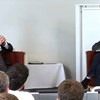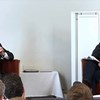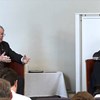cells
Calls for 2 PhD positions in a research program on partnerships for sustainable development
Calls for 2 PhD positions in a new research program Transformative Partnerships for Sustainable Development: Assessing synergies, effectiveness and legitimacy of United Nations Multi-stakeholder Partne.
Organizing on two wheels. Uncovering the organizational patterns of Hells Angels in Sweden.
Trends in Organized Crime, pp 1–17, doi:10.1007/s12117-017-9310-y Abstract During the last decades, Outlaw Motorcycle Clubs (OMCs) have become a concern for crime prevention and law enforcement agencies
Criminal nomads: The role of multiple memberships in the criminal collaboration network between Hells Angels MC and Bandidos MC
Global Crime vol. 23, no 2 Abstract Outlaw motorcycle gangs (OMGs) have received increased atten-tion from both law enforcement agencies and the research com-munity. This study investigates the criminal
For Whose Benefit? The Biological and Cultural Evolution of Human Cooperation
Springer, New York. DOI: 10.1007/978-3-319-50874-0 This book takes the reader on a journey, navigating the enigmatic aspects of cooperation; a journey that starts inside the body and continues via our
Restricted completion of sparse partial Latin squares.
Combinatorics, Probability and Computing, 1-21. doi:10.1017/S096354831800055X, Cambridge University Press. Abstract An n × n partial Latin square P is called α-dense if each row and column has at most αnnon-emp times in . An × array where each cell contains a subset of {1,…, } is a (, ) -array if each symbol occurs at most times in each row and column and each cell contains a set of size at most . Combining the notions of completing partial Latin squares and avoiding arrays, we prove that there are constants , > 0 such that, for every positive integer , if is an -dense × partial Latin square, is an × -array, and no cell of contains a symbol that appears in the corresponding cell of , then there is a completion of that avoids ; that is, there is a Latin square that agrees with on every non-empty cell of , and, for each , satisfying 1 ≤ , ≤ , the symbol in position (, ) in does not appear in the corresponding cell of .
A research agenda for the study of social norm change
Philosophical transactions A. Royal Society Publishing Abstract Social norms have been investigated across many disciplines for many years, but until recently, studies mainly provided indirect, implicitresearch may move beyond unequivocal praising of social norms as the missing link between selfinterestedbehaviour and observed cooperation or as the explanation for (the lack of) social tipping. It provides the toolkit to understand explicitly where, when and how social norms can be a solution to solve large-scale problems, but also to recognize their limits. This article is part of the theme issue ’Emergent phenomena in complex physical and socio-technical systems: from cells to societies’.

A conversation with Thomas Schelling part 3
www.iffs.se Thomas Schelling, an American economist and professor of foreign affairs who in 2005 was awarded the Nobel Memorial Prize in Economic Sciences for his analyses of game-theory, is interv

A conversation with Thomas Schelling part 2
www.iffs.se Thomas Schelling, an American economist and professor of foreign affairs who in 2005 was awarded the Nobel Memorial Prize in Economic Sciences for his analyses of game-theory, is interv

A conversation with Thomas Schelling part 1
www.iffs.se Thomas Schelling, an American economist and professor of foreign affairs who in 2005 was awarded the Nobel Memorial Prize in Economic Sciences for his analyses of game-theory, is interv

The Future of Work with Richard B Freeman
The future of work: the paradox of increased team production and greater inequality in pay in the knowledge economy. A seminar from Stockholm on the 14th of October 2013. Labour economist Richard B Fr








